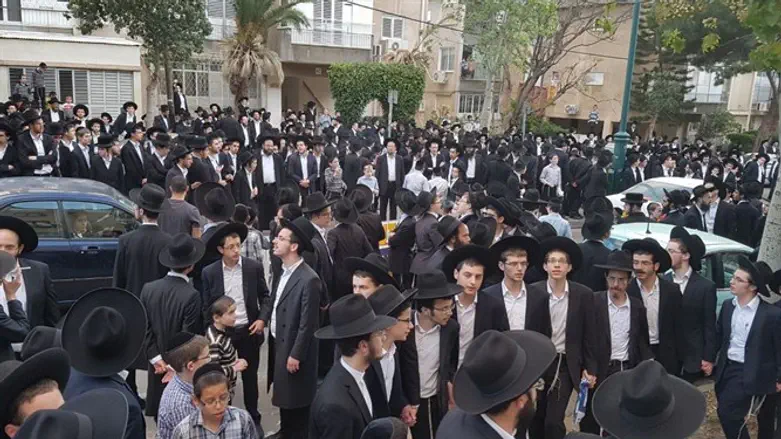
A hard-line anti-draft haredi movement has instructed its supporters not to vote in this Tuesday’s Knesset election, calling for a boycott of the two haredi parties participating in the election.
Rabbi Tuvia Shluzinger, one of the leaders of the Yerushalmi Faction and the Bnei Torah party explained in an interview with Arutz Sheva the Yerushalmi Faction’s decision not to endorse either of the haredi factions running in the upcoming election and to instead call for a boycott.
Speaking with Arutz Sheva, Rabbi Shluzinger accused all of the existing Knesset factions of taking part in an effort to preserve the draft law, undermining the status of religious institutions in Israel.
“All of the parties had a hand in liquidating the yeshivas and the Torah world, so they are all disqualified as far as we are concerned.”
Unlike the mainstream haredi leadership, which has accepted Israel’s near-universal draft law and sought only to preserve open-ended draft deferments for full-time yeshiva students, the Yerushalmi Faction has demanded that the haredi community receive a blanket draft exemption, similar to draft exemptions offered to most of Israel’s Arab community, who, with the exception of Druze men, are not required to serve in the IDF.
While most haredi leaders have called on yeshiva students to participate with Israeli draft authorities to obtain annual draft deferments, the Yerushalmi Faction has called on supporters not to recognize the authority of Israel’s draft boards, and to refuse to show up to army offices – even for the purposes of receiving deferments.
Rabbi Shluzinger castigated the major haredi political movements, chief among them the United Torah Judaism party.
“They call themselves [the party of] ‘Torah Judaism and the Sabbath’. But what have they ever done for Judaism? They brought us the Reform Western Wall [prayer space], but what did they do for the Torah? When the Draft Law was passed, what did they do for the Sabbath? Just mass Sabbath-desecration. Whoever votes in this election is empowering the people working to eliminate the yeshiva world.”
But unlike radical anti-Zionist movements like Neturei Karta, Rabbi Shluzinger said the decision to call for a boycott of this year’s election did not represent a fundamental opposition to participating in Israeli elections per say.
“The Edah Haharedit has, since the establishment of the State, opposed taking part in elections. With us it is a different thing. In the past we voted for Agudat Yisrael or Degel Hatorah,” two factions of the United Torah Judaism list. “Today, those representatives have betrayed their constituencies, and are not following in the path of Rabbi Shach.”
The Faction has in the past endorsed the Bnei Torah party, which ran against the larger, more established haredi parties in last year’s municipal elections.
But Bnei Torah declined to run in this year’s Knesset election, in part because of the difficulty it would face in overcoming the steep 3.25% electoral threshold required to enter the Knesset.
Nevertheless, the number of haredim who identify with the Yerushalmi Faction and Bnei Torah is enough to have a significant impact on the United Torah Judaism party in this week’s election.
Rabbi Shluzinger claims the Faction has the backing of some 40,000 haredi voters, or the equivalent of about 1.15 seats in the Knesset. With the combined haredi bloc of Shas and UTJ polling between 10 to 12 seats, the Yerushalmi Faction thus represents roughly the equivalent of a 10th of the overall haredi vote.
Despite the significantly lower turnout of municipal elections compared to legislative ones, Bnei Torah received more than 22,000 votes last year in votes in six separate municipal races last October.
